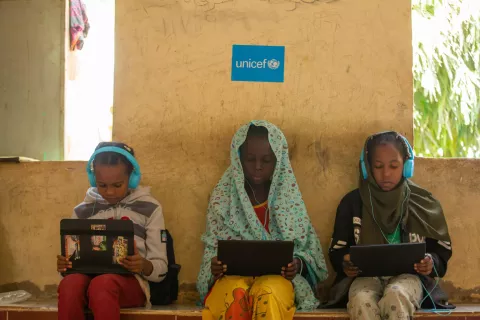Children resume exams in South Sudan
It’s been a long two years since these children were able to sit a primary school final. Now that the test has been reinstated, students like Nyaruon are doubling down on their studies so they can be prepared for the future.

BENTIU, South Sudan, 22 February 2016 – For children all over the world, exams can bring dread. But for a small group of students seeking shelter in South Sudan’s largest displacement camp, it’s a time of great excitement.
These students are sitting a national primary school final for the first time since conflict engulfed the country more than two years ago, the Primary 8.
Students from several counties across conflict-ridden Unity State are taking the exam, but the majority – 189, of whom 71 are girls – live in the Bentiu Protection of Civilians site. This sprawling tent and tin city is the largest United Nations-protected displacement camp in the country, sheltering some 120,000 people who have fled their homes over the course of the fighting.
Nyaruon sits the test
Sixteen-year-old Nyaruon Peter lives on the site. Her family fled their village in eastern Unity when it was attacked in April 2014. They escaped to Bentiu along with thousands of others.
“Before the crisis, I was in school,” she says. “But when we came to the [Protection of Civilians site], it was crowded, the insecurity was too much inside and outside, the area flooded, we were sheltering in tents. It was impossible to find a school.”
Nyaruon first heard about the emergency education services through local community leaders. She hiked across the site to find the nearest school.
Now, she tries to go to school five days a week and studies at the weekends. In addition to her schoolwork, Nyaruon helps her mother and father to look after her eight siblings. Her daily chores include fetching water, cooking and washing clothes.
Today, she is sitting the Primary 8. “I was studying until the early morning to prepare. The mathematics paper was very difficult for me, but I tried my best.”
Bringing back the Primary 8
South Sudan – the youngest country in the world – struggles with some of the lowest education indicators. Over half of primary- and lower-secondary-age children are not accessing an education. The adult literacy rate is about 32 per cent; for women, it is 25 per cent.
Nyaruon’s father, Peter Biel, never went to school. For him, it’s critical that Nyaruon finish her education. “I need Nyaruon to be in school so she will be a responsible person who can reach better things in life and pass on her knowledge when she has her own family. She will be an example,” he says.
The Primary 8 exam is a milestone along that journey. It signals the end of primary education and the start of secondary.
UNICEF has been working with representatives of both sides of the conflict to have the test reintroduced, since mid-2015. Nyaruon is among 3,700 children taking the test in areas in which conflict has made this rite of academic passage impossible.
“After two years of disappointment and obstacles because of the ongoing crisis, finally we managed to get these first children to take the exam,” says UNICEF's education officer in Bentiu Luel Deng Ding. “I am very satisfied and proud.”
Education on site
According to Ding, children under 18 account for more than 50 per cent of those living in the Bentiu site.
There are seven primary schools across the camp. UNICEF set them up and has supported them since 2013. They are staffed by teachers and assistants recruited from the community.

But space in the overcrowded site is limited, an obstacle to adding more schools. There is no secondary school, which severely limits opportunities for students who complete primary education and pass the Primary 8.
Education off site
Just 10 kilometres up a bumpy road from the Protection of Civilians site lies Bentiu, the state capital.
Off limits to humanitarians for most of the past year, the town is again accessible. UNICEF is working to repair and re-open another seven schools.
In fact, 11 young people are sitting the Primary 8 in Bentiu at the same time as the students inside the camp, a sign of success in reclaiming space for children outside the site.
And the test has meaning for the community, itself. “Taking this exam raises the spirits of the children and their families, and it encourages other children to register for school when they see their friends succeed,” says Ding.
For her part, Nyaruon has set her sights past the Primary 8. While she and her family shelter here, she hopes that secondary school can be on the horizon for the children of the Protection of Civilians site in Bentiu.
UNICEF’s goal is to get 30,000 children and young people living in the site back in education by the end of 2016.
Learn more about the humanitarian needs of the children of South Sudan.




